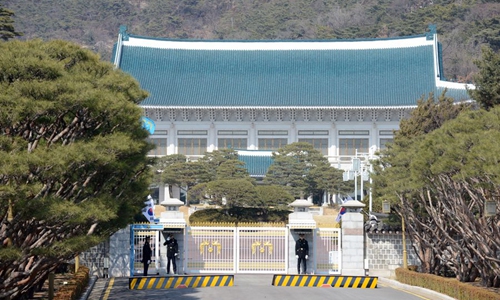HOME >> WORLD
S. Korea decides to conditionally suspend expiry of GSOMIA with Japan
Source:Xinhua Published: 2019/11/23 18:04:55

Police officers stand guard in front of the presidential Blue House in Seoul, South Korea, March 9, 2017. (Xinhua/Liu Yun)
South Korea's presidential Blue House decided on Friday to conditionally suspend the expiry of a military intelligence-sharing accord with Japan, called the General Security of Military Information Agreement (GSOMIA).
Kim You-geun, first deputy director of the National Security Office (NSO) of the Blue House, said in a televised press briefing that the government decided to suspend the "effectiveness of the GSOMIA expiration" notified three months earlier to Japan.
"Our government made the decision under the premise that (South Korea) can end the effectiveness of the GSOMIA at any time, and Japan expressed understanding on it," said Kim.
South Korea decided in August to terminate the GSOMIA, notifying Japan of its decision.
The decision was made in response to Japan's tighter control in July over its export to South Korea of thee materials, vital to make memory chips and display panels that are the mainstay of the South Korean export.
In August, Japan dropped South Korea off its whitelist of trusted trading partners that are given preferential export procedure. In response, Seoul removed Tokyo from its whitelist of trusted export partners.
The NSO deputy director noted that as long as trade talks between Seoul and Tokyo go on, South Korea will suspend its petition with the World Trade Organization (WTO) against Japan's export curbs.
South Korea lodged the complaint with the WTO against Japan on Sept. 11 for the export restrictions. Since then, the two sides held two rounds of talks in Geneva, Switzerland as part of the dispute settlement process under the WTO rules, but those talks ended without progress.
Seoul claimed that Japan's export curbs came in protest of the South Korean top court's rulings that ordered some of Japanese firms to pay reparation to the South Korean victims who were forced into hard labor without pay during the 1910-45 Japanese colonization of the Korean Peninsula.
The Blue House announcement came just about six hours before the scheduled expiry of the GSOMIA at midnight Saturday.
The deputy director's remarks indicated that South Korea would delay the GSOMIA termination on conditions that Seoul and Tokyo make efforts to resolve the bilateral trade and historical issues.
An unnamed South Korean defense ministry official was quoted by Yonhap news agency as saying the suspended effectiveness of the GSOMIA expiry would keep in place the current military intelligence exchanges between South Korea and Japan.
The official noted that the GSOMIA was expected to contribute to security cooperation and stability in the region and on the Korean Peninsula, anticipating that Japan would positively respond to South Korea's proposal in a bid to completely normalize the military intelligence pact in the near future.
Posted in: ASIA-PACIFIC